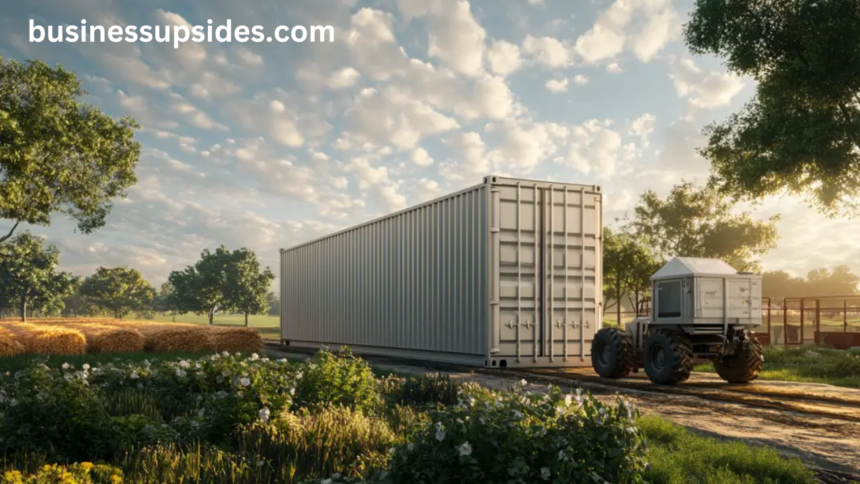In an increasingly mobile and fast-paced world, the need for efficient, secure, and accessible storage solutions has never been more critical. From household items to complex industrial equipment, the demand for versatile storage systems continues to rise. One of the most remarkable and versatile developments in storage technology has been the rise of containers, which have redefined how goods and personal items are stored, transported, and managed.
Containers, especially shipping containers, have evolved significantly over time, and their use extends far beyond just transporting cargo. In modern-day storage, containers serve a wide variety of purposes, from personal storage units to large-scale industrial storage systems. Their practical applications, ability to store goods securely, and efficient use of space have made them indispensable in various industries. In this article, we will explore how containers have evolved as a storage solution, their benefits, and the different ways they are used in various fields.
The Evolution of Container as Storage
The history of containers as storage dates back centuries, but the modern shipping container, the most widely used form today, has a relatively recent origin. The first containers were simply large wooden crates, used by merchants to transport goods. However, these early containers were inefficient and required significant labor to load and unload goods.
The Birth of the Shipping Container
The real breakthrough came in the 1950s when American businessman Malcolm McLean revolutionized cargo transport. Before McLean’s invention, goods were loaded and unloaded from ships piece by piece. This method was time-consuming, labor-intensive, and prone to delays. McLean developed the intermodal shipping container—an all-metal box designed to be loaded directly onto ships, trains, and trucks without needing to unpack the goods. This innovation made it possible to transport goods more efficiently across long distances and laid the foundation for global trade as we know it today.
McLean’s standardized shipping Container as Storage are typically 20 or 40 feet long and made of steel, with locking mechanisms to keep cargo secure. These containers could be transported on different modes of transportation, eliminating the need for unloading and reloading at various transfer points, thereby reducing labor costs and speeding up the process.
The Expansion of Container Storage Applications
Once the shipping container became widely adopted for its original purpose of transport, its versatility led to an expansion of its use beyond mere shipping. Containers quickly became a popular option for storage, providing a practical and secure solution to a variety of storage needs. They could be easily transported, stacked, and secured, and their robust construction offered durability and protection from the elements.
Today, the use of containers for storage extends far beyond the shipping industry. Whether used for residential storage, temporary storage at construction sites, or even as mobile offices, containers have proven to be an effective, low-cost solution in many different areas.
The Benefits of Using Container as Storage
Containers are a versatile and highly effective storage solution for a wide range of needs. Their popularity in both residential and commercial contexts can be attributed to the many advantages they offer over other types of storage solutions.
1. Durability and Security
One of the primary benefits of containers as storage is their durability. Made from strong steel or other durable metals, containers are built to withstand harsh weather conditions, rough handling, and prolonged exposure to the elements. The high-strength materials used in the construction of containers also make them extremely secure. With locking mechanisms, they can protect stored items from theft or unauthorized access.
For individuals or businesses storing valuable or sensitive materials, this added level of security is essential. Containers offer a peace of mind, knowing that the stored goods are secure from environmental hazards and theft.
2. Portability and Flexibility
Another key benefit of using Container as Storage is their portability. Containers are designed to be transported easily by truck, ship, or train. This means that goods stored in containers can be easily moved between locations. Whether you need to store items temporarily or transport them across the country, containers provide an efficient and cost-effective solution.
Moreover, containers can be stacked and arranged in different configurations, allowing for efficient use of space. This makes them ideal for use in environments where space is limited, such as urban areas or construction sites.
3. Cost-Effectiveness
Compared to other types of storage units, containers are often more affordable. Purchasing or renting a container for storage purposes is usually cheaper than renting warehouse space, which may involve additional costs for utilities, insurance, and maintenance. Since containers are typically made from durable, low-maintenance materials, their ongoing upkeep costs are minimal.
Additionally, the modular nature of containers allows businesses or individuals to expand their storage capacity without significant upfront investment. Containers can be stacked or combined to meet specific storage requirements, making them an economical and scalable solution.
Previous article; Essential Monsoon Fittings Instructions for a Rain-Ready Home
4. Versatility in Design and Use
Containers come in various sizes and configurations to meet different storage needs. From small 10-foot containers for personal storage to large 40-foot containers for industrial use, the variety of available sizes ensures that there is a container to meet every need.
Furthermore, containers can be customized for specific purposes. For example, some containers can be equipped with climate control features, making them suitable for storing perishable goods. Others can be fitted with shelving or racking systems to maximize storage efficiency. This flexibility allows containers to be used for a wide range of applications, from household storage to specialized industrial storage.
5. Sustainability and Environmental Benefits Container as Storage
Containers are made from metal, which is a highly recyclable material. Many old shipping containers are repurposed and given a second life as storage units. This repurposing not only reduces waste but also minimizes the need for new materials to be manufactured, thus reducing the environmental impact.
Additionally, the durability of containers means that they have a long lifespan, making them a sustainable storage option. With proper care, containers can last for decades, reducing the need for frequent replacements and further minimizing environmental impact.
Applications of Containers for Storage
Containers are used in a wide variety of settings, from individual households to large-scale commercial operations. Their adaptability and versatility have led to their adoption in many different industries.
1. Personal Storage
For individuals, containers are often used as portable storage units. These containers can be rented and delivered to homes or offices, allowing people to store their belongings without needing to rent expensive storage units or lease extra space. Once the container is full, it can be picked up and transported to a storage facility, eliminating the need for trips to a storage unit.
Additionally, containers are a popular choice for people in transition, such as those moving to a new home or temporarily relocating for work. Containers provide a convenient and flexible option for storing belongings during the move, especially for those who may not yet have a permanent residence.
2. Construction and Industrial Storage
In industries like construction, Containers as Storage often used for storing tools, equipment, and materials on-site. Construction sites are dynamic and ever-changing, and the ability to securely store materials and tools in a container helps prevent theft and weather-related damage.
Moreover, containers can serve as temporary offices or workspaces on construction sites, providing a mobile and secure environment for contractors and workers to conduct business and store paperwork. With the addition of insulation, electrical wiring, and other modifications, containers can become functional offices, workshops, or break areas, supporting the needs of workers on the go.
3. Commercial and Retail Storage
Businesses can also benefit from using container as storage. Retailers, for example, often use containers for off-site inventory storage, allowing them to free up space in their retail locations. Similarly, warehouses use containers to store goods that need to be moved or distributed but aren’t yet ready for sale or delivery.
Many e-commerce businesses that deal with high volumes of inventory also use containers to organize and store products, helping them streamline operations and manage stock levels. Containers provide an efficient solution for businesses that need flexibility in their storage operations.
4. Agricultural and Perishable Goods Storage
Agricultural operations often require specialized storage conditions to preserve the freshness and quality of their goods. Containers with temperature control features can be used to store perishable items, such as fruits, vegetables, dairy, and meat. These containers provide a secure and stable environment, ensuring that the stored goods remain fresh until they reach their destination.
Additionally, containers can be used to store large quantities of grains, fertilizers, and other agricultural products. Their large capacity and resistance to weather conditions make them ideal for the agricultural industry.
5. Emergency and Disaster Relief Container as Storage
During emergencies, natural disasters, or humanitarian crises, containers are often used for storing and distributing supplies. Their portability and secure construction make them an ideal choice for storing essential items such as food, water, medical supplies, and clothing. Containers can be quickly deployed to disaster zones, providing immediate storage and logistical support for relief efforts.
Furthermore, containers can be used as temporary shelters or medical clinics during emergencies, offering a safe and secure environment for both aid workers and those in need.
6. Military and Defense Storage
The military and defense sectors are also major users of containers for storage. Containers are used to store equipment, supplies, and even vehicles in military bases, where secure and organized storage is crucial. The modular design of containers makes it easy to transport large amounts of supplies to remote locations, which is particularly useful in combat or deployment situations.
Containers are also employed to create mobile command centers, secure storage for sensitive materials, and facilities for troop accommodations in the field. Their ability to withstand harsh conditions and provide versatile, secure storage makes them an invaluable resource in defense logistics.
Conclusion
Container as Storage have proven to be an incredibly versatile, durable, and cost-effective solution for a wide range of needs. From their origins as shipping tools to their widespread use across industries, containers have continuously evolved to meet the demands of modern society. Whether used for personal storage, construction, agriculture, or military purposes, containers offer unmatched flexibility and security.
With their long lifespan, portability, and ability to withstand extreme conditions, containers are likely to remain an essential part of our storage infrastructure for years to come. As industries and individuals continue to find new and innovative ways to utilize containers, their role in storage will only continue to grow, reinforcing their status as one of the most enduring storage solutions in the modern world.



